AS DOC RIVERS sat on the sidelines at Ball Arena in Denver on Jan. 29, watching the Milwaukee Bucks up close for the first time as their new coach, he had an idea for a playcall.
In the two days since he was formally introduced as Milwaukee’s coach, Rivers estimated he had watched film on the Bucks’ offense at least 50 times. He says he’d noticed a play the Bucks had run earlier in the season, which had been productive every time they ran it but had seemingly disappeared from the team’s repertoire.
And now, he thought, was the perfect time to run it.
But there was an issue. Rivers didn’t know how to call it. Or rather, what terminology to signal from the sidelines to communicate it to the players on the floor.
“I had to turn to Joe [Prunty, a Bucks assistant who served as interim coach for three games], like, ‘Hey, what’s the play called where Bobby, you know …”
“I just know for a while, it’s going to be tough,” Rivers said after his Bucks coaching debut, a 113-107 loss.
Rivers’ prediction turned out to be prudent. Eleven games into his Bucks tenure, Rivers is 4-7, matching the worst start through 11 games of his 25-year coaching career. Milwaukee was 30-13 on the day they fired Adrian Griffin, moving on from their first-year coach despite a gaudy record because general manager Jon Horst said he believed the team needed a coach with a championship pedigree.
Horst made the midseason move to hire Rivers, a champion coach with a track record of coaching stars, to help the team reach a higher ceiling than they believed was possible under Griffin.
“He had to jump on a moving train,” a team source told ESPN. “And then help direct it.”
Less than a month later, as Rivers sat inside a gym at the University of Minnesota following the team’s first practice after the All-Star break, he exuded only confidence despite coming off one of the more discouraging losses of this Bucks season, a 113-110 defeat against the Memphis Grizzlies on Feb. 15.
“I like our team,” Rivers told ESPN. “We’re going to be good.”
A laminated sheet filled with different playcalls and sets sat on his lap. He says he has a better handle on the team’s terminology now.
“Everything is new,” Bucks star Damian Lillard told ESPN. “When you have that, you’re going to have some moments where you struggle a little. Our wins and losses have been more of a sign of those types of things rather than that’s where we are as a team.”
On Sunday, Rivers leads the Bucks back to one of his old stomping grounds in his first matchup against the Philadelphia 76ers (1 p.m. ET on ABC) since he was dismissed as coach in May after three seasons.
“It’s funny — my friends at least, they’re like, ‘How you doing?'” Rivers said, putting on a concerned voice before breaking into a smile.
“And I’m like, ‘I’m great. I’m happy. I love this team. The organization is solid, man, and we got a chance. Could we win a title today? I don’t know. But when it’s time, I think that answer will be yes.”
FOR THE FIRST time since the 1998-99 season — the lockout-shortened campaign following the famous “Last Dance” of Michael Jordan’s Chicago Bulls — the NBA season began without Doc Rivers coaching.
Rivers doesn’t recall where he spent the first days of the season. Since being fired by Philadelphia, he says he has spent a lot of time on golf courses — he’s a regular at Riviera and Bel-Air Country Club, both in Los Angeles. He spoke regularly to his friend, Los Angeles Rams head coach Sean McVay, and stopped in for a practice.
Rivers has long been an admirer of football coaches, quoting a book from legendary Miami Dolphins coach Don Shula in his first week on the job in Milwaukee, and marveling at the way the best ones can command a roster of about 60 players and get them on one accord.
“The break was great for me, I will say that,” Rivers said in Minneapolis. “Twenty-four years straight — [the break] gave me more passion. I tried to look at all the things that I didn’t do well. It’s easy to focus on your record and you’ve won a lot, but what haven’t you done well? What can you do better? How can you reach the players better?”
The eight months without a coaching job mark the longest stretch Rivers has had away since he was fired by the Orlando Magic 11 games into the 2003-04 season. He was hired as coach in Boston the following season, eventually advancing to the NBA Finals twice and winning his lone championship in 2008.
Since then, Rivers’ career has been a mix of tantalizing potential and dramatic disappointments. Rivers took the Los Angeles Clippers to the playoffs in six of his seven seasons, ushering in the most sustained success in franchise history, but he never got out of the second round and finished with a 27-32 (.458 winning percentage) career playoff record. He then was hired in Philadelphia and guided the Sixers to the best record in the Eastern Conference in his first season.
But as he reflected this summer about what he’d learned from his decades on the bench, and what he might do differently if he ever got the chance to do it again, he thought back to one of the more painful episodes of his tenure: the emotional end of that first season in Philly, when the Sixers lost in Game 7 of their second-round series to the Atlanta Hawks, a game made infamous by the performance of Ben Simmons.
“I had a terrible press conference after that Game 7,” Rivers said. “We lost. I said something — I meant something different, but it was taken differently. That started it. Then Joel [Embiid] had a bad press conference.
“I don’t know if the whole Ben thing was going to happen regardless, but I didn’t like me being a part of that. So your first thing is, how can I handle that better? How can I answer that question better?”
Rivers never got out of the second round in three seasons in Philadelphia, finishing 20-15 (.571) in the playoffs. He was fired after losing Game 7 to the Boston Celtics in the 2023 playoffs and had reported tension with star guard James Harden. “Our relationship is OK,” Harden said about Rivers following their season-ending loss.
Austin Rivers, an 11-year NBA veteran who now works as an analyst for ESPN, said of his dad, “He’s not a guy that’s not going to call guys out and hold guys accountable.
“Those type of things can be hard for players to deal with. And obviously managing relationships off the court with your players, he’s got to do a better job with that. He knows that.”
In his previous roles in Philadelphia and Los Angeles, Doc Rivers knew the job included coaching stars and providing a culture change in places that needed it. In Milwaukee, where a championship foundation is already established, he says the latter is less necessary.
“I resist thinking that you can’t coach players,” Rivers said. “Where I’ve gotten myself in trouble at times, especially with star players, just because he’s a star, if that’s the way you have to win, I still believe you still have to [challenge] him. And if you don’t, if you’re not effective doing that, you’re not going to win anyway.
“So I have no problem [holding players] accountable, and if it doesn’t work out, it doesn’t work out. Because I’ve learned one thing, if you don’t do it, you’re not going to win.”
Rivers has preached patience since taking the job in Milwaukee, reiterating the difficulty of taking over a franchise midseason.
And after the franchise fired longtime coach Mike Budenholzer, hired Griffin, made a blockbuster trade to land Lillard, fired Griffin and hired Rivers in the span of eight months, the stakes couldn’t be higher for the Bucks’ remaining 25 games of this regular season.
“If he wins with this team… if they somehow turn this around and win, it’s going to be the ultimate ‘F you’ championship,” Austin Rivers said.
“And listen, it could go the other way if they go into it next year, and it doesn’t look good. You’re playing with fire on both sides.”
ON FRIDAY NIGHT, the Bucks put together perhaps their most complete performance of the season in a 112-107 victory against the Minnesota Timberwolves.
They went on a 20-2 run to end the third quarter and outscored the Timberwolves 36-13 in the period, Minnesota’s fewest points scored in a quarter since November 2021.
“We understand what our jobs are, what we want to do, how we need to play to be successful,” Lillard said after the game, Milwaukee’s first out of the All-Star break.
Antetokounmpo added: “We played well against a good team. We came out, set the tone. Defended well, [gave up] 13 points in the third quarter. Fourth quarter, they came back, we kept our composure. We executed.
“All those things, those are the things that count … All those things, those are things you can carry over to the next game. Hopefully, this is just a step.”
The Bucks’ performance in Friday’s win underscored the reasons behind Rivers’ optimism. Defense was the most pressing issue Rivers was brought in to address. The Bucks were 19th in defense on the day Griffin was fired, surrendering 121.1 points per 100 possessions. In 11 games with Rivers at the helm, the Bucks rank 11th, giving up just 113.2 per 100 possessions.
“We can be a better defensive team than everyone thought we could be,” Rivers said. “We have it in us. We have a different level that we could go to. We’ve shown it in the last 10, but I think there’s even a better version of that.”
One early area of focus has been defending on-ball screens. The Bucks have allowed 0.96 points per direct pick since Jan 29, fifth best in the NBA. Prior to this stretch, they ranked 22nd (1.03 points per pick). They have switched on defense more than Rivers believes he has ever instructed a team to do, on 32% of on-ball screens compared to 23% before Rivers, according to research by ESPN Stats & Information.
“We’re big, we’re not fast,” Rivers said. “Switching keeps guys in front of you. And the more size we can put in front of people, the better we can be.”
Rivers also has Bucks protecting the rim again, searching for matchups that allow Antetokounmpo to roam on defense and contest shots in the paint (the team is contesting 13.2 paint shots per 100 possessions under Rivers, compared to 9.7 earlier in the season). Milwaukee ranks fourth in field goal percentage allowed at the rim under Rivers, according to Second Spectrum tracking data.
“We’ve been keeping things more simple and clear,” Lillard said. “That’s been a big part of it. Addressing what people’s roles are, what’s expected of us. And said in front of everybody, this is what we want you to do, what we need you to do. Not this, but this.”
The Bucks’ offense, meanwhile, remains a problem. Milwaukee ranks 24th under Rivers, but forward Khris Middleton has only played four of those 11 games because of an ankle sprain. Brook Lopez has missed three games. Lillard missed a pair of games and is in one of the worst shooting slumps of his career, entering Friday last in the NBA in field goal percentage (40.1%) since Jan. 1 among players with at least 300 attempts, according to research by ESPN Stats & Information.
“I’m not concerned, I will say that,” Rivers said about the offensive struggles. “I just want [Dame] and Giannis to connect faster, so we may do some artificial connecting on the floor. Just so they can see it and get it, because once they get it, it’s over.”
Back inside the gym, as Bucks players began filing off the court at the end of practice, Rivers looked over at Lillard, who had sat down on the other end of the bench and begun taking his shoes off.
“We just got to get that guy to be him,” Rivers said motioning over to his star guard.
Then his gaze shifted to Antetokounmpo, who was still on the court. Rivers knows how important it is to further connect his star duo, and said he wasn’t sure when exactly it would click, only that he was sure it would.
The first practice out of the break had energized Rivers in the same way that his first shootaround in Denver three weeks ago, the first morning of his new job, did. He recalled a phone conversation with his brother, Grady, after leaving the arena that day.
“I missed it more than I thought,” Rivers recalled telling his brother. “I thought I may not do this again. If the right job [didn’t come up] I wasn’t doing it.
He paused. And continued.
“Then the first day … man, I felt like I was at home again. I didn’t know that. I just felt normal. Good. I felt full. You’ve got to be full when you’re working and I felt full.”



